Most Popular
Korean History
-
1
2014 ferry disaster left scars that never healed
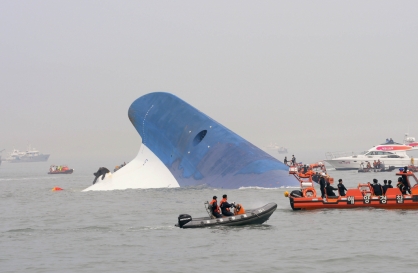
-
2
In 2012, K-pop makes leap from 'Gangnam' to the world
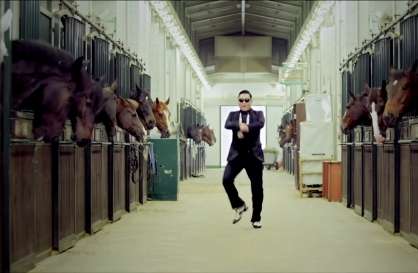
-
3
Deadly sinking of Navy ship in 2010 marks worst postwar military disaster

-
4
In 2008, Korea's National Treasure No. 1 went down in flames
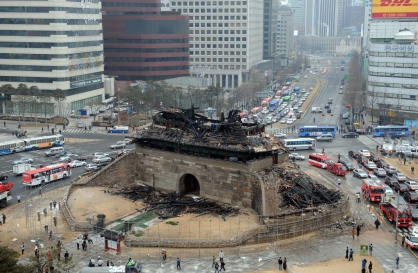
-
5
In 2005, science world’s biggest scandal unravels in Seoul
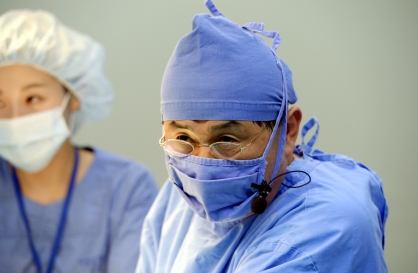
[Korean History] Hero or villain? Park Chung-hee leaves behind complicated legacy
Military strongman who ruled South Korea for 18 years remains a divisive figure with reign of economic accomplishments and crackdowns on democracy
By Yoon Min-sikPublished : Feb. 8, 2023 - 15:26
"History through The Korea Herald” revisits significant events and issues over the seven decades through articles, photos and editorial pieces published in the Herald and retell them from a contemporary perspective. – Ed.
Last Wednesday, President Yoon Suk Yeol visited the birthplace of Park Chung-hee, a military strongman who ruled South Korea with an iron fist for nearly two decades until 1979, calling him “a great leader.”
A day before Yoon’s visit to Gumi, North Gyeongsang Province, civic groups in the city released statements opposing the city’s plan to construct memorials for the former leader, saying that spending city funds to idolize Park would make Gumi “a nationwide laughingstock to people that remember the dictator, who was pro-Japanese (during Japan’s colonization of Korea) and who trampled on the country’s democracy.”
From a great leader who pulled the country out of poverty to a dictator who cracked down on pro-democracy movements, there is a wide gulf in Koreans' perception of Park.
A magnet of controversy in death as he was in life, the military strongman’s reign ended with his death by assassination in 1979. This is somewhat ironic, as his control over the country had also commenced at gunpoint when he led a military coup to overthrow the government in 1961.
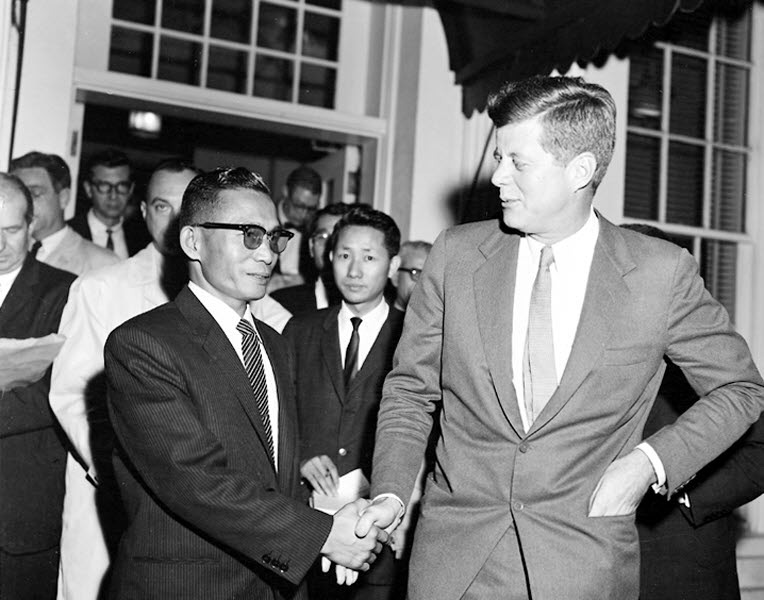
On May 16, 1961, Park rises to power
The May 17, 1961 edition of The Korean Republic -- the forerunner of The Korea Herald -- carries the news of Park’s revolt through its top story, “Coup d’etat manages control of government.” It also shows how military units were moved into Seoul amid the hostile takeover, then-President Yun Po-sun’s call for order and how the junta government was headed by Chang Do-yung, the army’s chief of staff.
In fact, the newspaper makes it sound as if Chang, not Park, was the man who led the military coup, with another headline saying “Gen. Chang heads junta.” Park -- a major general at the time -- is only mentioned nearly halfway into the aforementioned top story, as one of the seven generals who led the coup.
It is now widely believed that the late Chang, a four-star general and Park’s superior at the time of the coup, was made a temporary figurehead leader by Park. He was removed from all posts and arrested on the charge of conspiring a counter-coup in July, less than two months after he held a leadership role.
In his 2001 memoir, Chang claimed that he learned of Park’s plotting just a day before it took place. He died in 2002 in Orlando, Florida, US.
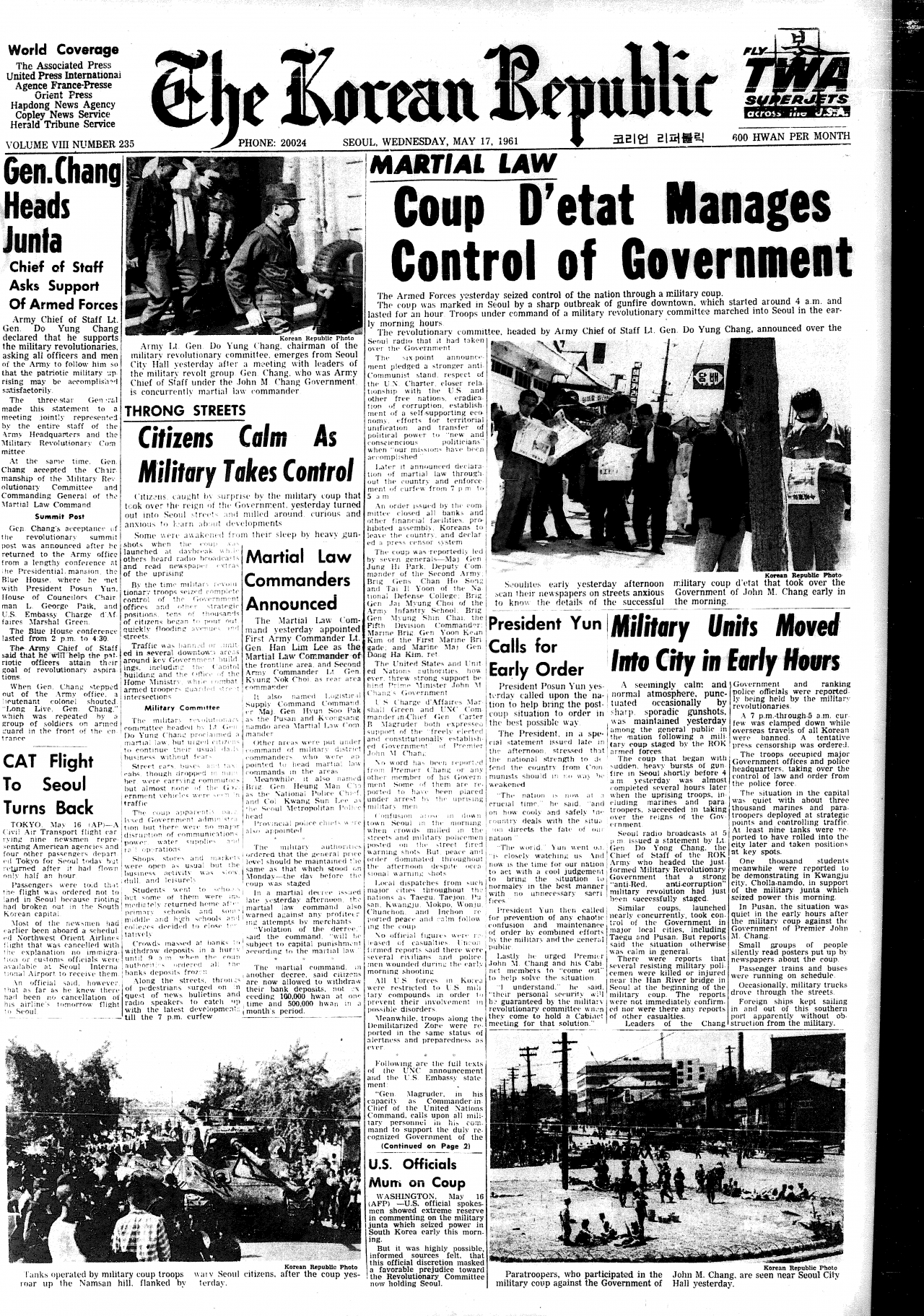
While the military coup in 1961 effectively handed Park his reign over the country, it was not until the presidential elections two years later that he officially assumed top office. The Oct.17, 1963 edition of The Korean Republic carries the top news “Park squeaks by Yun,” showing how Park won the election over Yun, who was president when the coup took place, by the slimmest of the margins.
The margin of 1.55 percent would remain the smallest margin in the history South Korea’s presidential elections for the next 25 years, before Kim Dae-jung beat Lee Hoi-chang in 1998 by a margin of 1.53 percent. The current record is the 0.73 percent margin in last year’s election, in which incumbent Yoon beat his rival Lee Jae-myung.
Park seems to have relished his close victory, as the side story “Fair elections source of pride, Park says,” recalls. “Conducting fair and honest elections are part of the revolutionary government’s task,” he was quoted as saying.
The emphasis on fairness and honesty was possibly a nod to the election fraud on March 15, 1960, which triggered a nationwide protest that resulted in the resignation of President Syngman Rhee. The ousting of a strong leader left a power vacuum, in which Park and participants of the 1961 coup entered.
Park’s boastful comments about the fairness eventually turned into bitter irony as not 10 years later, he conducted a self-coup in 1972 that effectively granted him dictatorial powers. What is known as the “Yushin Constitution” included the abolishment of direct presidential elections, granting presidents the power to recommend one-third of lawmakers and allowing presidents to run for unlimited terms; which meant that a president could theoretically remain in power until he or she dies.
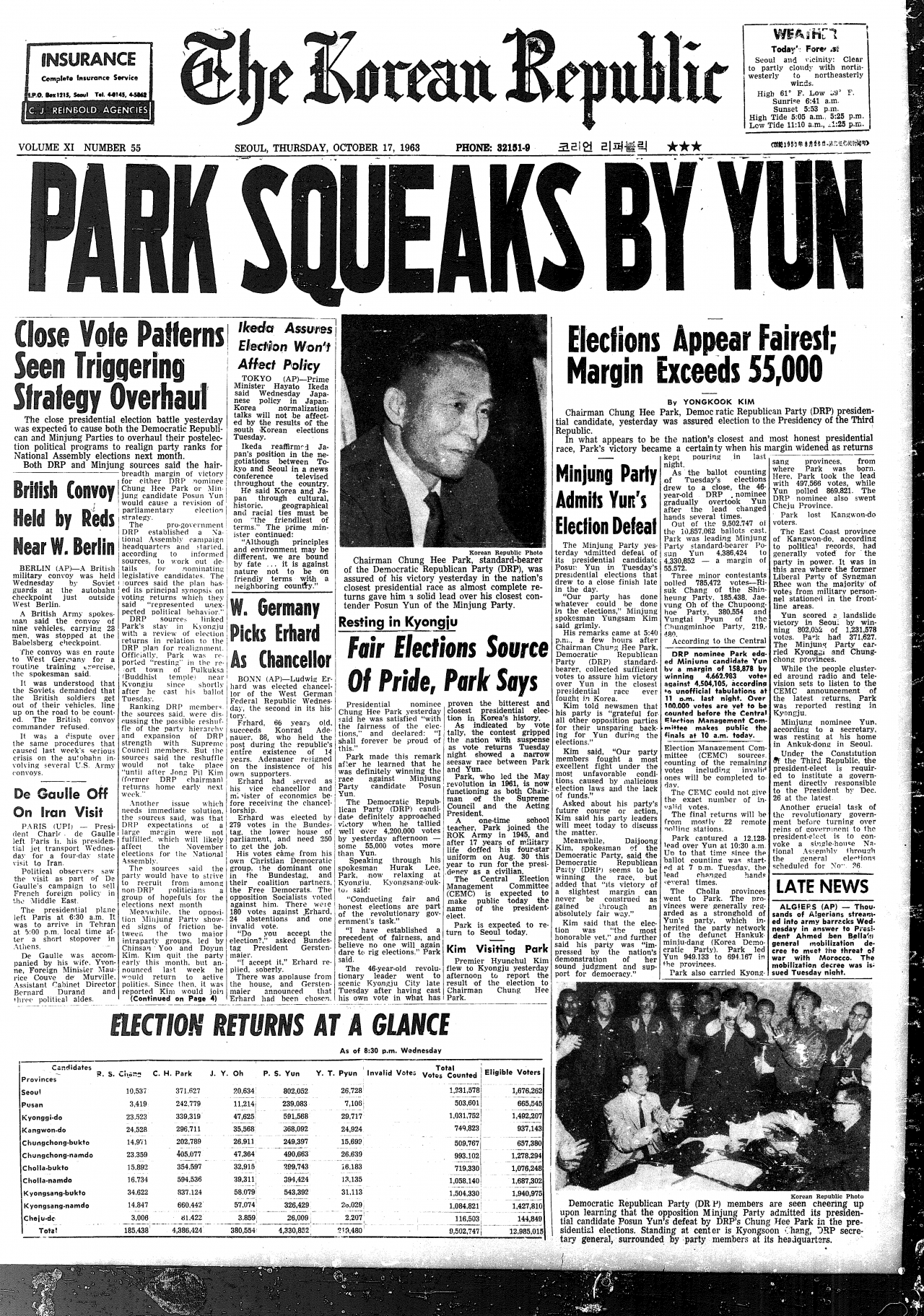
Criticism surrounding Park mainly focuses on the fact that he was a dictator, and that he brutally mowed down any attempts to reinstate democracy and direct presidential elections -- which were only restored in 1987, eight years after his death. But despite this, Park is largely credited for his economic and social development plans for the country, which laid the foundation for the country’s transformation from a war-torn, poor nation to one of the Four Asian Tigers. For this reason, he remains one of the most popular, if not the most popular, presidents for South Koreans, particularly among the conservative, older generations.
Park’s popularity and his darker side
Park’s popularity remains strong well into the 21st century. The nonprofit think-tank, the East Asia Institute, released a survey in 2021 based on the responses of 1,000 South Koreans. It showed that Park topped the list for the best president, followed by former Presidents Roh Moo-hyun, Kim Dae-jung and then-incumbent Moon Jae-in.
In another 2021 survey by Real Meter on 500 adults across the country, Park again led all candidates on the favorite president category with 32.2 percent of the respondents picking him, followed by Roh (24 percent), Moon (12.6 percent) and Kim (7.9 percent). In a hypothetical race between Park and Roh, the survey showed that the former would win 47.3 percent to 45.8 percent.
Last September, local pollster Kstat Research conducted a survey on which president was most trustworthy: Roh led with 29.8 percent, followed by Park at 24.3 percent, and Moon at 15.1 percent.
The biggest reason for Park’s popularity lies in the economic growth South Korean underwent during his 18-year reign.
In 1961, the gross national income per capita was $82, a figure that skyrocketed to $1,638 in 1979. South Korea's exports went from $40 million to $15 billion in the same period, marking an average yearly growth of just under 10 percent.
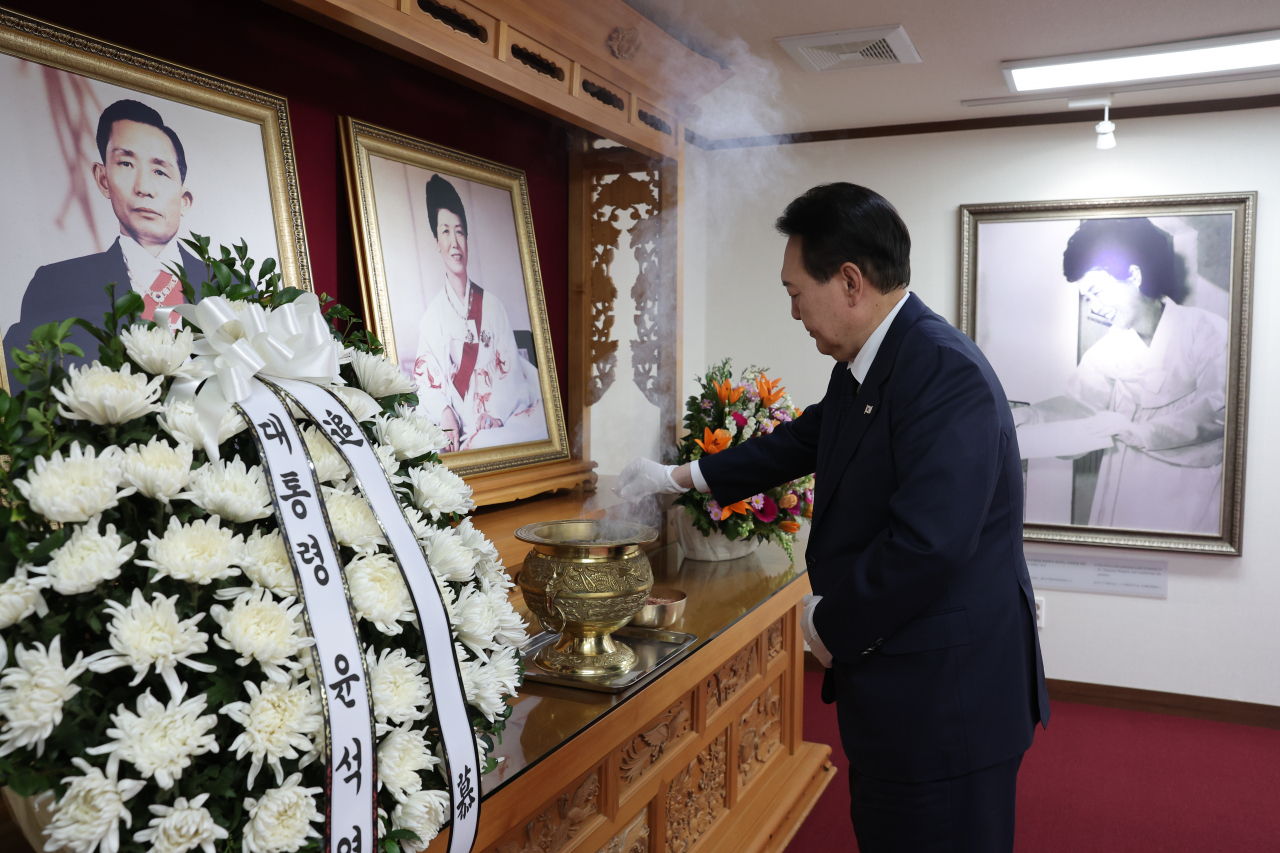
But while Park’s tenure was marked by the biggest economic growth the country had ever seen, it was tainted by violations of human rights and the suppression of dissidents and pro-democratic movements.
One such case was the so-called “Inhyeokdang incident” of 1974, when pro-democracy activists were tortured into making false confessions about trying to organize a pro-communist group, which the Park administration falsely pinpointed as the mastermind behind student protests against it. Eight activists were executed the following year, and it wasn’t until 2007 that a retrial cleared the names of those involved.
In 2012, then-presidential candidate Park Geun-hye -- Park’s daughter and eventual winner of the race -- publicly apologized to those who suffered from the government abuse under her father’s rule, including the victims of the Inhyeokdang incident.
In 2013, then-Gumi Mayor Nam Yoo-jin stirred nationwide dispute by praising Park Chung-hee as “half man/half-god, sent from the heavens.” The city came under controversy last year when reports surfaced of it spending hundreds of billions of won in building memorials for Park.
These two comments that took place a year apart symbolizes the complicated relationship between South Koreans and Park. As many haters Park as has, he has even more admirers. The military coup, dictatorship and rapid economic growth during his reign leave behind a multifaceted legacy that may be too complex to summarize in just a few words.
























![[Today’s K-pop] Treasure to publish magazine for debut anniversary](http://res.heraldm.com/phpwas/restmb_idxmake.php?idx=642&simg=/content/image/2024/07/26/20240726050551_0.jpg&u=)